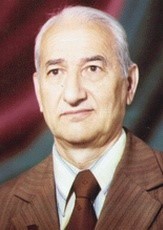Lev Lopovok was born in 1916 in Poltava, Ukraine. His father, Mendel Lopovok, was a typesetter and the owner of a large library that included books ranging from rabbinical literature to the works of Karl Marx. The young Lev began to study at a kheder, and then moved to a Soviet school. Upon graduation, he entered the Poltava Teachers Institute, studying at the Faculty of Mathematics and Physics. In 1941, when the Soviet-German war broke out, Lopovok was working as a teacher in the village of Onufriivka, southwest of Poltava.
Despite his exemption from military service, Lev Lopovok volunteered for the Red Army on the second day of the war, June 23, 1941. His first engagement with the enemy was a bayonet charge that took place on August 8, 1941. Later, he would admit to a correspondent of the Moscow-based Yiddish newspaper Eynikayt that it was by sheer miracle that he, a fresh volunteer, survived this hand-to-hand combat.1 In November 1941, Lopovok was wounded. After being discharged from hospital, he was sent to an artillery school and returned to combat service as a lieutenant. He was attached to the 31st Army deployed in the Rzhev area, northwestern Russia. There, he was to take part in the operation that would become known to posterity as the "Rzhev Meat Grinder". After a successful breakthrough of the German defense in August 1942, Senior Lieutenant Lopovok was given command of the artillery of the 521st Rifle Regiment. In September 1942, while repelling an enemy tank attack, Lopovok suffered a concussion, and in March 1943 he was wounded by a shell fragment. Following this injury, in July 1943, Lopovok was transferred to the "artillery reserve" and tasked with training new officers in the use of new artillery techniques. As a mathematician, he was interested in ballistic theory, and published several articles on that subject.
Lopovok was decorated three times, receiving the Order of the Red Star and two Orders of the Patriotic War – 2nd and 1st degree, respectively.
In September 1943, following the liberation of Poltava by the Red Army, Lev Lopovok wrote to the local authorities and to acquaintances, trying to find out the fate of his family members that had stayed under German occupation. He learned that his parents and sister, Dina, had been killed by the Nazis. After the war, Lev Lopovok resumed his pedagogic career. In 1962, he took the chair of geometry and the methodology of teaching mathematics at the Luhansk Pedagogic [Teachers'] Institute, becoming head of this chair in 1963. Lev Lopovok was one of the leading math teachers in the Soviet Union. Millions of schoolchildren in Ukraine and other republics of the Soviet Union learned geometry from his book of problems. His textbooks on elementary mathematics for schoolchildren and schoolteachers have been translated into various languages.
Lev Lopovok died in 1992.
- 1. GARF 8114-1-181, sh. 579-582







